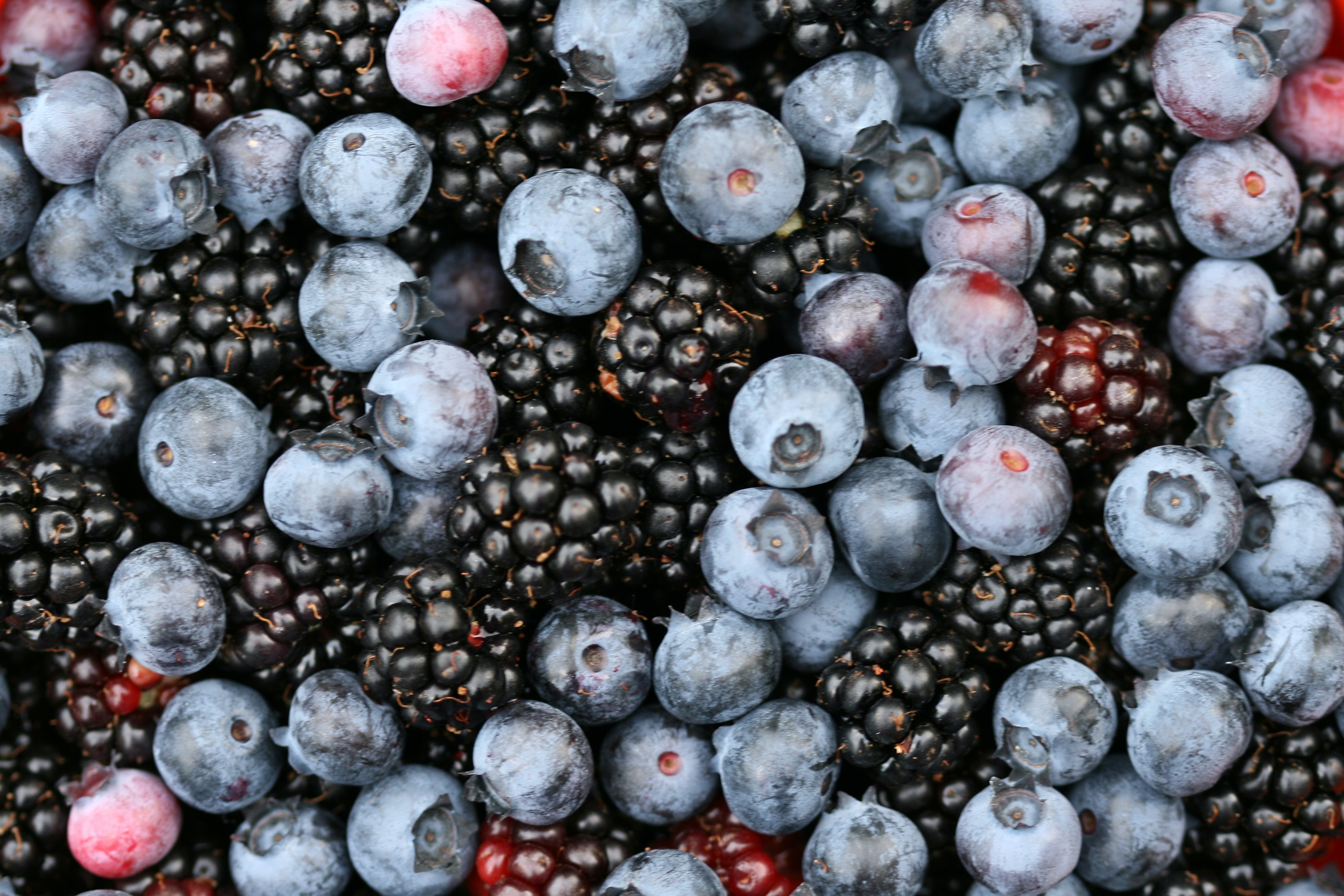In the pursuit of vitality and longevity, the profound impact of nutrition cannot be overstated. It serves as the bedrock of our overall well-being, shaping the trajectory of our health and influencing the potential for a robust and enduring life. Within this expansive realm, fruits emerge as integral components of a balanced and healthy diet, offering an array of essential nutrients and bioactive compounds. This exploration seeks to unravel the intricate interplay between nutrition and longevity, with a specific focus on discerning fruits that prove particularly beneficial and those that necessitate a more measured approach.
Want to check your body aging?
Take the Base quiz to get a personalized test recommendation and improvement plan to increase longevity.
The Best Fruits for Longevity
Berries: Antioxidant Powerhouses
Berries are often considered beneficial for longevity due to their rich content of various bioactive compounds and nutrients that have been associated with positive health effects.
- Antioxidant Properties: Berries are packed with antioxidants, such as anthocyanins, flavonoids, and polyphenols. These compounds help neutralize harmful free radicals in the body, which can contribute to aging and various chronic diseases. By reducing oxidative stress, antioxidants may play a role in promoting longevity.
- Anti-Inflammatory Effects: Chronic inflammation is a common factor in aging and age-related diseases. Berries have been shown to possess anti-inflammatory properties, potentially mitigating inflammation and its associated negative effects on health.
- Cardiovascular Health: Berries, especially those rich in anthocyanins like blueberries, have been linked to improved cardiovascular health. They may help lower blood pressure, reduce arterial stiffness, and improve overall vascular function, which can contribute to a longer and healthier life.
- Blood Sugar Regulation: Maintaining stable blood sugar levels is crucial for overall health. Berries, with their relatively low glycemic index and high fiber content, may help regulate blood sugar levels, reducing the risk of type 2 diabetes and its associated complications.
- Brain Health: Some studies suggest that the antioxidants in berries may have neuroprotective effects, potentially reducing the risk of cognitive decline and neurodegenerative diseases. Blueberries, in particular, have been studied for their positive effects on cognitive function.
- Rich in Nutrients: Berries are a good source of essential vitamins, minerals, and fiber. They provide nutrients like vitamin C, manganese, and folate, which contribute to overall health and may play a role in promoting longevity.
- Weight Management: Berries are relatively low in calories and high in fiber, which can contribute to feelings of fullness and aid in weight management. Maintaining a healthy weight is often associated with a lower risk of chronic diseases and a longer lifespan.

Citrus Fruits: Immune Support and Beyond
Citrus fruits are often considered beneficial for longevity due to their rich nutritional profile, including a variety of vitamins, minerals, and bioactive compounds. Here are some scientific reasons why citrus fruits contribute to longevity:
- Vitamin C Content: Citrus fruits are well-known for their high vitamin C content. Vitamin C is a potent antioxidant that helps neutralize free radicals in the body. Free radicals can contribute to oxidative stress, which is linked to aging and various chronic diseases. By reducing oxidative stress, vitamin C may play a role in promoting overall health and longevity.
- Anti-Inflammatory Properties: Chronic inflammation is associated with several age-related diseases. Citrus fruits contain anti-inflammatory compounds, such as flavonoids, that may help reduce inflammation in the body. By mitigating chronic inflammation, these fruits may contribute to a healthier aging process.
- Heart Health: Citrus fruits have been linked to cardiovascular health. The flavonoids in citrus fruits, such as hesperidin and naringin, may have protective effects on the cardiovascular system. They can help lower blood pressure, reduce cholesterol levels, and improve overall vascular function, which are factors associated with a longer and healthier life.
- Cancer Prevention: Some studies suggest that certain compounds found in citrus fruits may have protective effects against certain types of cancer. For example, limonoids and flavonoids in citrus fruits have been investigated for their potential anticancer properties, although more research is needed in this area.
- Immune System Support: Vitamin C is essential for a well-functioning immune system. It stimulates the production of white blood cells and enhances the activity of immune cells, helping the body defend itself against infections and illnesses. A robust immune system is crucial for overall health and longevity.
- Collagen Synthesis: Vitamin C plays a key role in collagen synthesis, which is important for maintaining the health of the skin, blood vessels, bones, and other connective tissues. Healthy connective tissues contribute to overall structural integrity and can be associated with a longer and healthier life.
- Disease Prevention: Citrus fruits, with their diverse array of nutrients, may contribute to the prevention of chronic diseases such as diabetes, neurodegenerative disorders, and certain cardiovascular conditions. These diseases can significantly impact lifespan, and a diet rich in citrus fruits may offer protective effects.

Avocado: Healthy Fats and Nutrient Density
Avocado is often considered beneficial for longevity due to its unique nutritional profile, which includes a variety of essential nutrients and bioactive compounds. Here’s a scientific and clear explanation of why avocado is associated with promoting longevity:
- Healthy Fats: Avocados are rich in monounsaturated fats, particularly oleic acid. This type of fat is associated with heart health and has been linked to a reduced risk of cardiovascular diseases. A healthy cardiovascular system is crucial for overall longevity.
- Anti-Inflammatory Properties: Avocados contain various bioactive compounds, including polyphenols and carotenoids, which have anti-inflammatory properties. Chronic inflammation is associated with aging and age-related diseases, and mitigating inflammation can contribute to a longer and healthier life.
- Antioxidant Content: Avocados contain antioxidants like vitamins E and C. Antioxidants help neutralize free radicals in the body, reducing oxidative stress. Lowering oxidative stress is linked to a decreased risk of chronic diseases and may contribute to longevity.
- Nutrient Density: Avocados are nutrient-dense, providing a wide array of vitamins and minerals, including potassium, folate, vitamin K, and vitamin B6. These nutrients are essential for various bodily functions and contribute to overall health and vitality.
- Heart Health: Avocados may help regulate cholesterol levels. The monounsaturated fats, along with the presence of beta-sitosterol, contribute to lowering LDL (low-density lipoprotein) cholesterol levels while maintaining or increasing HDL (high-density lipoprotein) cholesterol levels, supporting cardiovascular health.
- Blood Sugar Regulation: Avocados are a good source of dietary fiber, including both soluble and insoluble fibers. The fiber content helps regulate blood sugar levels by slowing down the digestion and absorption of carbohydrates, reducing the risk of type 2 diabetes.
- Weight Management: The combination of healthy fats and fiber in avocados promotes a feeling of fullness and satiety. Including avocados in the diet may contribute to weight management, and maintaining a healthy weight is often associated with a longer and healthier life.
- Eye Health. Avocados contain lutein and zeaxanthin, carotenoids that are important for eye health. These compounds may help protect against age-related macular degeneration and maintain overall visual function.

Fruits to Limit for Longevity
High-Sugar Fruits: Moderation is Key
High-sugar fruits can have potential downsides when consumed in excess, and understanding the scientific reasons behind this can shed light on why they might be considered less favorable for longevity. Here are the key points:
- Blood Sugar Regulation: Fruits high in sugar can lead to rapid spikes in blood sugar levels. When blood sugar rises, the pancreas releases insulin to facilitate the uptake of glucose into cells. Over time, repeated spikes in blood sugar and insulin levels may contribute to insulin resistance, which is associated with various health issues, including type 2 diabetes.
- Inflammation and Oxidative Stress: Excess sugar in the bloodstream can contribute to the formation of advanced glycation end products (AGEs). AGEs can promote inflammation and oxidative stress, both of which are linked to aging and chronic diseases. Chronic inflammation is a key factor in the development of conditions associated with reduced longevity.
- Weight Gain and Obesity: Fruits high in sugar can be calorically dense. Consuming large amounts of high-sugar fruits without considering overall calorie intake may contribute to weight gain and obesity. Obesity is a risk factor for various health conditions, including heart disease, diabetes, and certain cancers, which can impact longevity.
- Dental Health: High-sugar fruits can contribute to dental issues. Bacteria in the mouth feed on sugar, producing acids that can erode tooth enamel, leading to cavities and other dental problems. Poor dental health has been linked to systemic health issues and can affect overall well-being.
Examples of high-sugar fruits that, when consumed in excess, may pose potential challenges for some individuals:
- Bananas are nutritious and contain essential vitamins and minerals. However, they are relatively high in natural sugars, particularly fructose. Consuming large quantities of bananas without considering overall sugar intake might contribute to elevated blood sugar levels.
- Grapes are naturally sweet and contain natural sugars like glucose and fructose. While grapes offer some health benefits, they are calorie-dense and can contribute to sugar intake. Dried grapes (raisins) are even more concentrated in sugar, so portion control is important.
It’s crucial to note that fruits, even those higher in natural sugars, are generally part of a healthy diet. Moderation is key, and the negative effects mentioned are more likely to occur when there is an excessive intake of high-sugar fruits, especially in the context of an overall diet that is high in processed sugars and lacking in other essential nutrients.
Canned Fruits: Watch for Added Sugars
Canned fruits can have certain drawbacks that may impact their nutritional profile and, in some cases, may be considered less optimal for overall health and longevity. Here are some reasons why canned fruits might be perceived as less favorable, along with examples of canned fruits that might have potential downsides:
- Some canned fruits may be packed in syrup, which often contains added sugars. Excessive sugar intake has been linked to various health issues, including obesity, type 2 diabetes, and cardiovascular diseases. Canned peaches in heavy syrup are an example of a canned fruit that may contain added sugars. The syrup adds extra calories and sugar without providing significant nutritional benefits.
- The canning process can result in the loss of certain heat-sensitive nutrients, such as vitamin C and some B vitamins. Additionally, the heating process used during canning may reduce the overall nutrient content of the fruits. Canned pineapple may experience a loss of vitamin C during processing. Fresh pineapple, in comparison, may retain more of its original vitamin C content.
- Canned fruits may be packed in cans lined with Bisphenol A (BPA), a chemical that has raised concerns due to its potential endocrine-disrupting properties. BPA can leach into the food, and excessive exposure has been associated with various health issues. BPA can be present in the lining of many canned fruits, so this is a general concern rather than specific to certain fruits.
- Some canned fruits, especially those labeled as “canned in juice” or “canned in light syrup,” may still have added sodium. High sodium intake is linked to hypertension and can contribute to cardiovascular issues. Canned fruit cocktail might contain added sodium, especially if it is labeled as “in light syrup.” Checking the nutrition label can help you identify the sodium content.
- The quality of the fruit in canned form may not be as high as fresh or frozen alternatives. The texture of the fruit can change during the canning process, and certain varieties may not withstand the process as well as others. Canned berries, such as strawberries or blueberries, may have a softer texture compared to fresh ones, and the flavor profile can be altered.

Not all canned fruits are created equal, and some may be better choices than others. When choosing canned fruits, opt for those packed in water or their own juice rather than heavy syrup, and choose varieties labeled as “no added sugars” or “low sodium” when possible. Additionally, incorporating a variety of fresh, frozen, and canned fruits can contribute to a diverse and balanced diet. Always check the nutrition labels and choose options that align with your dietary preferences and health goals.
Balancing Fruit Consumption for Longevity
Balancing fruit consumption is a crucial aspect of promoting longevity and overall health. Two fundamental principles for optimizing fruit intake involve diversifying fruit choices and practicing mindful consumption, prioritizing quality over quantity. Let’s delve into these principles in more scientific detail:
Diversify Your Fruit Intake
Fruits are rich sources of diverse nutrients, including vitamins, minerals, and antioxidants. Different fruits contain unique combinations of these bioactive compounds, offering a wide array of health benefits.
Consuming a variety of fruits ensures that individuals obtain a broad spectrum of nutrients, contributing to overall health and potentially reducing the risk of nutrient deficiencies.
The vibrant colors of fruits are often indicative of specific phytochemicals and antioxidants. For example, anthocyanins in dark berries have been associated with anti-inflammatory and neuroprotective effects, while beta-carotene in orange fruits is a precursor to vitamin A, crucial for vision and immune function.
Including a colorful assortment of fruits in the diet allows for a broader intake of phytochemicals, which may contribute to antioxidant defenses and cellular health.
Seasonal fruits are harvested at their peak ripeness, maximizing their nutrient content and flavor. These fruits are more likely to be locally sourced and may undergo minimal processing, preserving their nutritional integrity.
By aligning fruit consumption with seasonal availability, individuals may benefit from fresher, more nutrient-dense options, potentially enhancing the overall nutritional quality of their diet.

Mindful Consumption: Quality Over Quantity
While fruits offer numerous health benefits, they also contain natural sugars, primarily fructose. Excessive sugar intake, even from natural sources, has been associated with metabolic disturbances, insulin resistance, and inflammation.
Practicing moderation in fruit consumption ensures that individuals derive the nutritional benefits without overloading the body with sugars that may contribute to adverse health effects.
Whole Fruits Over Juices:
Whole fruits provide not only sugars but also essential dietary fiber. Fiber slows down the absorption of sugars, regulating blood glucose levels and promoting satiety. Additionally, dietary fiber supports gastrointestinal health and may contribute to weight management.
Fruit juices, on the other hand, lack the fiber content found in whole fruits and can lead to more rapid spikes in blood sugar levels. The absence of fiber may also contribute to a less favorable metabolic response.
Fresh, Frozen, or Canned in Water:
The choice of fruit preparation can impact overall dietary quality. Fresh and frozen fruits retain their natural nutritional content, while canned fruits may undergo some nutrient loss during processing.
Opting for fruits canned in water rather than heavy syrup reduces added sugar intake, promoting a more healthful dietary choice. It ensures that individuals receive the natural sweetness of the fruit without unnecessary caloric content from added sugars.
Conclusion
In conclusion, a scientific approach to fruit consumption involves recognizing the nutritional diversity offered by different fruits, understanding the benefits of phytochemicals present in colorful varieties, and making informed choices that prioritize seasonal and minimally processed options. Mindful consumption, focusing on the quality of fruit choices and maintaining moderation, forms a foundational element of a balanced and health-promoting diet. Combining these principles with an overall holistic approach to wellness, including regular physical activity and lifestyle factors, contributes to the pursuit of longevity and well-being.
Already have lab results from your annual physical?
Get a nutritional plan based on your lab results to improve longevity and overall health